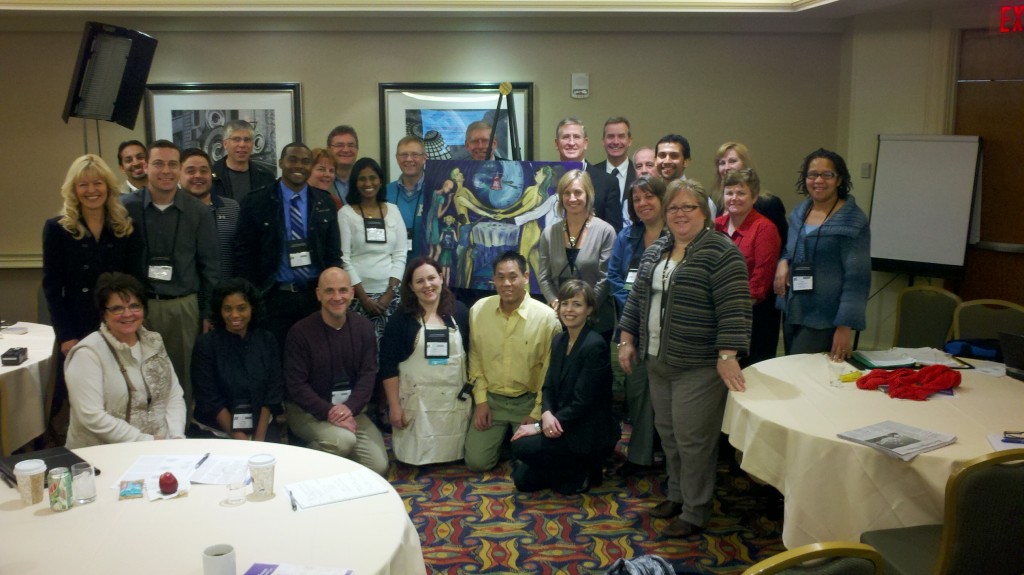 I’m at the annual IHI Forum in Orlando, in an all-day workshop (class photo at left) titled “Whose Care Is It, Anyway … and Can Health IT Help?” Laura Adams of the Rhode Island Quality Institute was just talking about the social obstacles to data mobility – doctors who don’t want to share their records with other providers. She cited something a patient told her:
I’m at the annual IHI Forum in Orlando, in an all-day workshop (class photo at left) titled “Whose Care Is It, Anyway … and Can Health IT Help?” Laura Adams of the Rhode Island Quality Institute was just talking about the social obstacles to data mobility – doctors who don’t want to share their records with other providers. She cited something a patient told her:
You make me sign a consent form to SHARE my data; you oughta ask my consent for you to HOARD it.
____________
A lot of great stuff is happening here at IHI. Medical muralist Regina Holliday created a great painting (see photo above; I hope it will be auctioned), and at my table I found Abington Memorial Hospital, who wrote a report function for their EMR system so they can hand the patient a daily care plan every day, so they can help manage care!
Regina is one of about 50 patients who were flown in for a Patient Advocate Summit yesterday. All the patients were given scholarships to attend the whole conference. But, they have to donate their time – more about this in a moment – so Regina and others were unable to stay for the whole event. Regina also has substantial babysitter expenses.
Primary sponsor for patient participation is the Cautious Patient Foundation, with twenty others providing support. Thank you!
It will be great to have patients in the IHI conference sessions. Note, though, that they still have to donate their time. As I said in January, I bet this is one of the key reasons our health policies haven’t solved healthcare: everyone BUT the consumer/patient gets paid to be there, and we patients have to take time off work.
How many EMR or hospital employees would attend those meetings if they had to take time off work?
And that, ladies & gents, is part of why our policies allow doctors to hoard our records. Without our consent.






And not one mention over how lack of knowledge/control over what goes on to your medical records can affect you when you lose group health coverage and need to apply for individual, underwritten plans.
Every day I have to give homework to clients, who think their condition is over with, but medical records don’t reflect it…therefore underwriters have to issue declines…because med records don’t say “issue is resolved. No further treatment necessary” until pressed to do so. At least till 2014, and maybe beyond if things keep up the way they seem to be going now…
Hi Dave,
I know I speak for all 50-or-so patient advocates that we feel privileged to have received scholarships to attend the IHI Forum and be a collective voice for patients. The Forum was inspiring and I’m hopeful that this will be the beginning of a productive partnership between IHI and patients.
It was evident from the workshops that we have some great healthcare leaders to thank for implementing safe, high quality, patient-driven care in their communities and patient advocates to thank for raising awareness, empowering/educating patients and doing the pushing along the way.
Thank you for acknowledging that the majority of us do this work on a volunteer basis; many for years. We know we bring value to improving healthcare quality and empowering patients, but like so many consumer-driven causes, there is little funding for the work that we do. I am hopeful that this will change, as the pressure to sustain these improvements in our healthcare system is needed now more than ever. We know that when the voices of patients are heard and acted upon, both patients and providers benefit.
Thank you also for using your powerful voice to spread the word about our work and our passion.
Lori, I’m so glad I ran into you on the plane down to the IHI Forum.
It was a sobering collection of stories that people brought into those rooms. I know it was taxing for everyone, having so many meeting rooms to participate in; I hear on the final day most of the patient group didn’t join any sessions because there was so much energy in the group that they met all day.
Our Society here has a listserv facillity, if the group wants to use it.